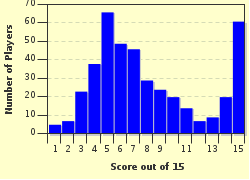Quiz Answer Key and Fun Facts
1. The English term "messiah" comes from the Hebrew word, "mashiach". What is the literal meaning of this word?
2. One of the best-known visions of the Messianic age is the following: "Nation shall not lift up sword against nation, neither shall they learn war anymore. But they shall sit every man under his vine and under his fig-tree; and none shall make them afraid". What is the source of this famous quotation?
3. According to Jewish tradition, which of the following is NOT a requirement for the Messiah?
4. The twelfth-century philosopher and physician, Maimonides (the Rambam), did NOT include belief in the Messiah amongst his thirteen articles of faith.
5. What is the English equivalent of the Hebrew expression "It's a shame we weren't talking about the Messiah"?
6. Israeli rock and roll star Shalom Hanoch recorded a song that included the lyrics, "The Messiah isn't coming, and he isn't telephoning either" in 1984. What event inspired Hanoch's pessimistic song?
7. According to Jewish folklore, what will we eat at the meal after the Messiah arrives?
8. According to Jewish legend, what will be the birthday of the Messiah?
9. During the Holocaust, Jews awaiting the gas chambers in Nazi death-camps sang, "I believe in a perfect faith in the coming of the Messiah, and even though he tarry, still I wait for him" to a haunting melody. When was this melody written?
10. Jewish belief holds that human action can affect the Messiah's coming. Which of the following is said to be something that will hasten the Messiah?
11. Which popular Jewish singer had a 1997 hit with a song about the Messiah?
12. In the seventeenth century, the Jewish world was turned upside down by the appearance of a false messiah. What was his name?
13. Which of the Biblical prophets is considered the "harbinger" of the Messiah?
14. Which of the following blessings or prayers contains a prayer for the coming of the Messiah?
15. Which modern Jewish religious personality was considered to be the Messiah by many of his followers?
Source: Author
janetgool
This quiz was reviewed by FunTrivia editor
CellarDoor before going online.
Any errors found in FunTrivia content are routinely corrected through our feedback system.

